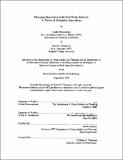| dc.contributor.advisor | Gloria Schuck. | en_US |
| dc.contributor.author | Navasargian, Andre, 1975- | en_US |
| dc.contributor.author | Thompson, Tyler D. 1974- | en_US |
| dc.contributor.other | Massachusetts Institute of Technology. Dept. of Urban Studies and Planning. | en_US |
| dc.date.accessioned | 2006-03-29T18:23:36Z | |
| dc.date.available | 2006-03-29T18:23:36Z | |
| dc.date.issued | 2000 | en_US |
| dc.identifier.uri | http://hdl.handle.net/1721.1/32200 | |
| dc.description | Thesis (S.M.)--Massachusetts Institute of Technology, Dept. of Urban Studies and Planning, 2000. | en_US |
| dc.description | Includes bibliographical references (leaves 101-105). | en_US |
| dc.description.abstract | Management teams in real estate firms are in a precarious position as they struggle to manage innovation without much experience in planning and executing technology-driven strategies. Real estate technology is in its infancy. The growth trajectories of innovations and the impacts of novel technologies on the future of the real estate industry have yet to be seen. This is an important time for board members and senior managers of leading real estate firms because innovation is a double-edged sword. A sound technology policy can be highly lucrative, while a failed technology strategy can prove positively fatal. This thesis studies the complexities of managing innovation in the real estate industry. It builds on the study of innovation and strategic management in other industries to provide insight into the future of the real estate industry. Managing innovation is not a new problem - there is a significant body of scholarship on the topic that has been developed through rigorous study of several industries ranging from disk drives to retailing. Researchers have produced a set of analytical frameworks and detailed case studies that explore the interaction between innovation and firm-level strategic management. This paper applies some of these analytical tools to study the nature of innovation in the real estate industry and uncover potential opportunities and pitfalls facing managers in the future. | en_US |
| dc.description.statementofresponsibility | by Andre Navasargian & Tyler D. Thompson. | en_US |
| dc.format.extent | 105 leaves | en_US |
| dc.format.extent | 5733987 bytes | |
| dc.format.extent | 5744482 bytes | |
| dc.format.mimetype | application/pdf | |
| dc.format.mimetype | application/pdf | |
| dc.language.iso | eng | en_US |
| dc.publisher | Massachusetts Institute of Technology | en_US |
| dc.rights | M.I.T. theses are protected by copyright. They may be viewed from this source for any purpose, but reproduction or distribution in any format is prohibited without written permission. See provided URL for inquiries about permission. | en_US |
| dc.rights.uri | http://dspace.mit.edu/handle/1721.1/7582 | |
| dc.subject | Urban Studies and Planning. | en_US |
| dc.title | Managing innovation in the real estate industry : a theory of disruptive innovations | en_US |
| dc.type | Thesis | en_US |
| dc.description.degree | S.M. | en_US |
| dc.contributor.department | Massachusetts Institute of Technology. Department of Urban Studies and Planning | |
| dc.identifier.oclc | 48528539 | en_US |
